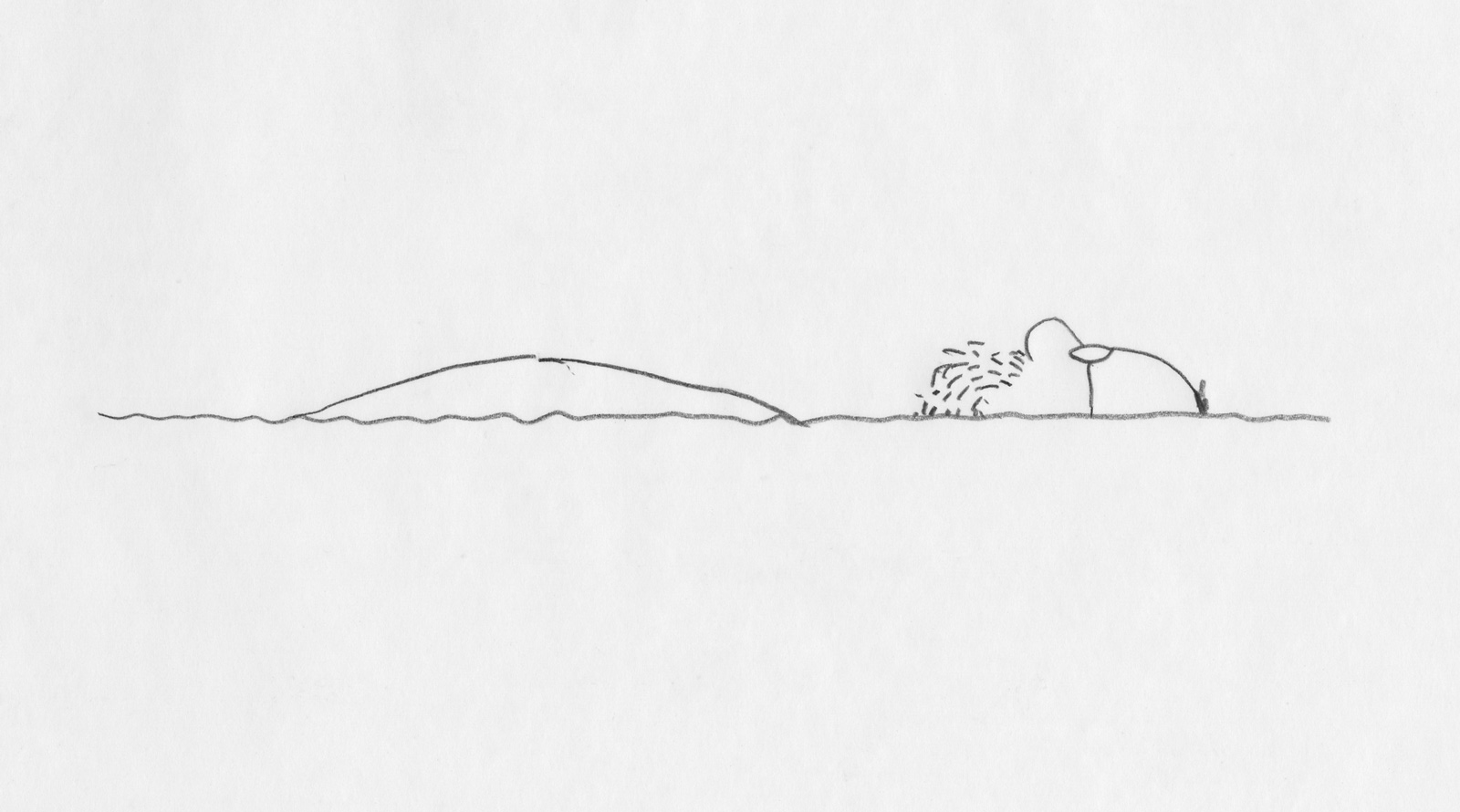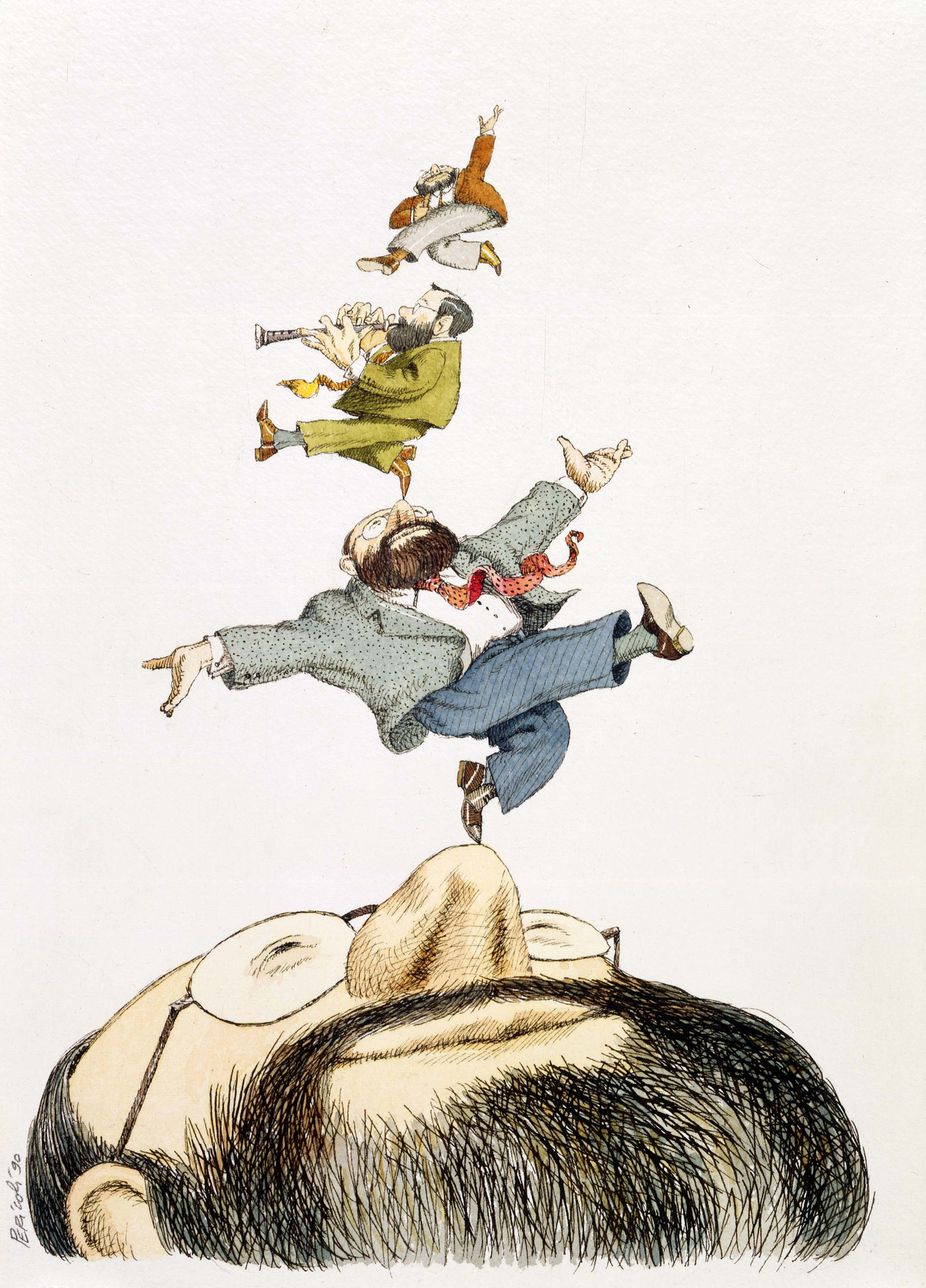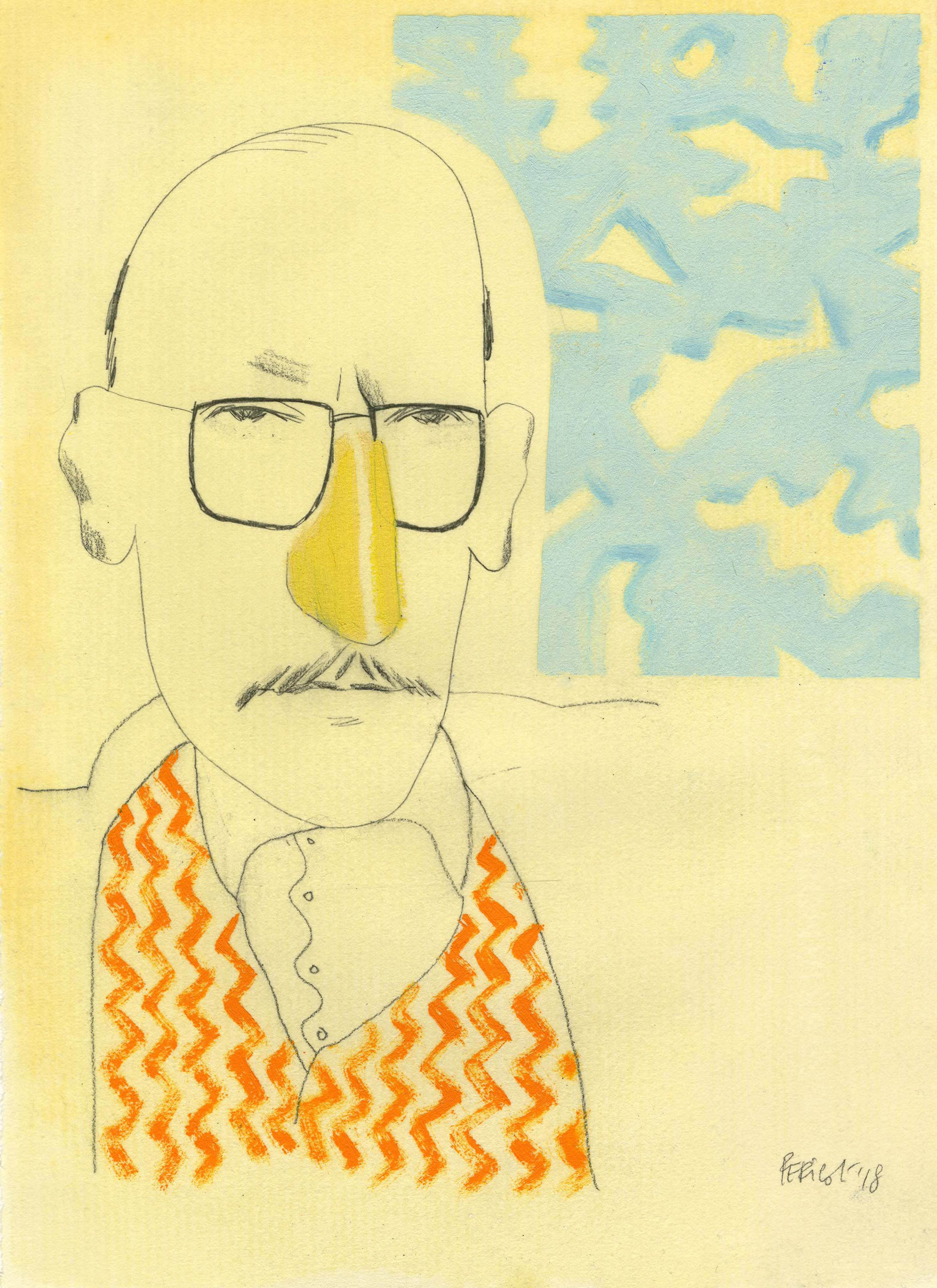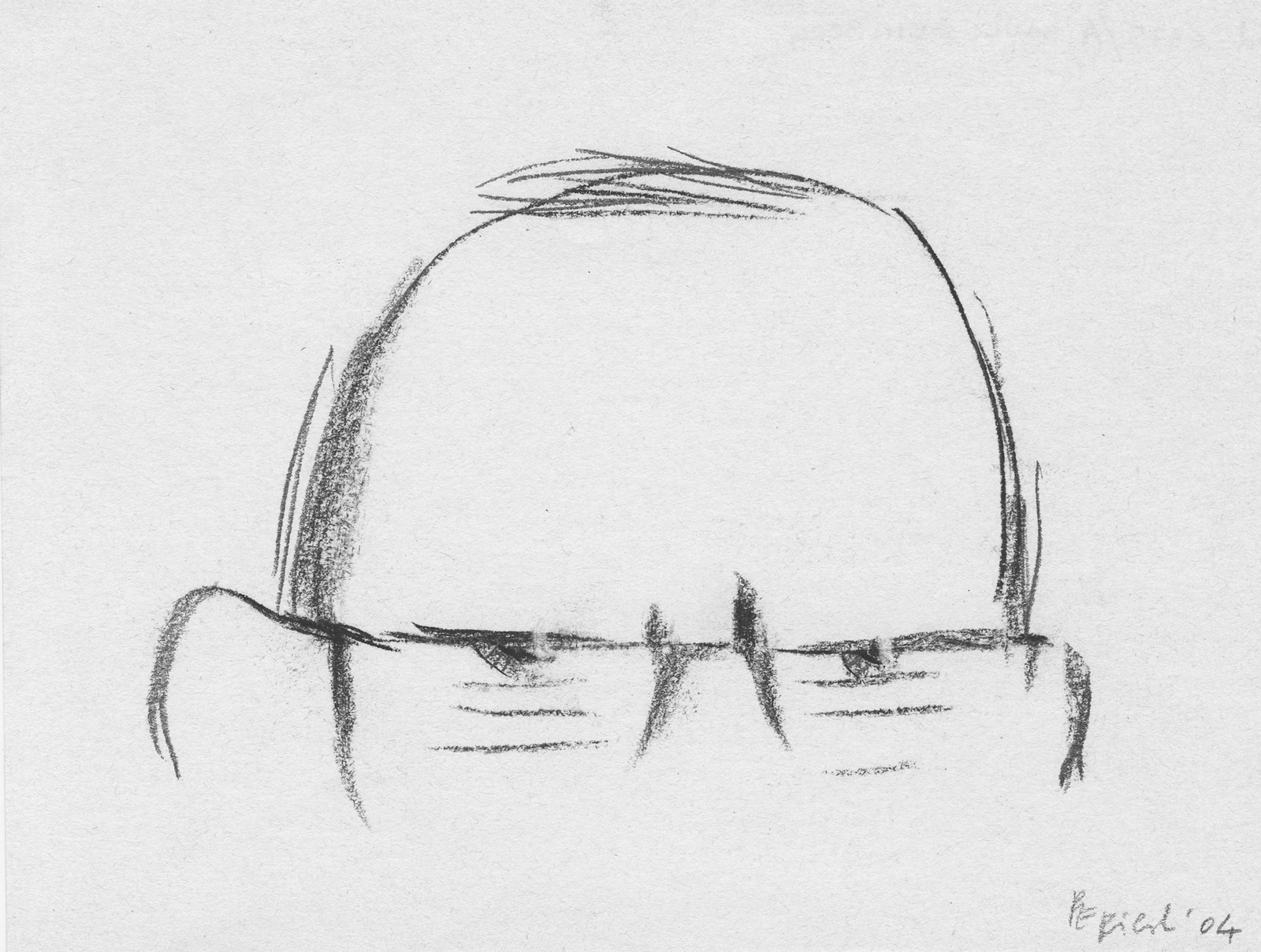When my love affair with the city of Milan began, Umberto Eco, who was only four years older than me, was already practically editor-in-chief of Bompiani publishing company. I sought him out, arranged a meeting, and pitched my drawings to him. Clean-shaven, his fair skin in contrast with his dark hair, he had pleasant features and a voice that occasionally bordered on shrill. He never lost that metallic falsetto.
Nothing came of the meeting, but what remains of it in my memory is a tone of kindness that Eco didn’t actually display but, rather, thought. Eco thought through every single thing, whether it was something he had to do or something that had to be done to him. I believe he also thought a lot about his death, just as he thought about and planned for what came after.
Our real meeting came on the heels of a letter he wrote me in 1977 in which he asked for the original of a drawing I did of him that was published in the Corriere della Sera.
“I certainly can’t return the favor by sending you a typescript of one of my articles with handwritten corrections. In the best-case scenario, it would only acquire value as a collectible in a couple of centuries, which is to say after the Apocalypse,” he added in his letter.
As he confided to Silvia Ballestra, our families became close friends, and that included our children, wives, and grandchildren. We spent time together in Milan, in Monte Cerignone, and at our home in Rosara, near Ascoli. What he loved most about the house in Rosara was the swimming pool: he spent hours floating in it. His body kept him buoyed up naturally. I remember how he’d rest on the water without moving and let the waves from other swimmers gently rock his body. Back then, his house in Monte Cerignone didn’t have a swimming pool. “Talk to Renate about it, tell her it’s no big deal,” he’d say. But Renate, his wife, didn’t want a pool. She had enough to do hosting all their friends and didn’t need to deal with a pool as well. And then one was built for him.
Eco was one of the people I spent the most time with but knew the least. He deserves a lifetime record for never talking about himself, not even in his novels. Not until the very end. Essentially, I think he deprived himself of a pleasure. I mean, who doesn’t like to talk about themselves, and sometimes even whine a little?
By not confiding in others, others were not inclined to confide in him. I would never have talked to him about something that saddened me or about a love story that was causing me heartache. He would’ve tried to cheer me up, of course, but probably by telling me a joke. It was easier to understand his mind than his soul. Eco was interested in the mind; he lived for his mind. For him, souls were stupid. And he was probably right: the soul arouses passion, not reason. The soul devolves into the irrational, the soul blathers.
Once—we were already old at the time—we were sitting on the lawn in Monte Cerignone and I said, “Umberto, do you ever have someone in mind when you write? I do. I usually have one or two readers in mind, not always the same ones, but friends or people I hold in high esteem. What about you?”
Eco never had anyone in mind. “Maybe the people who’ll read my work in a couple of generations,” he said.
“But what about the critics or your millions of readers?” I asked. “Nope.”
Was that why he chose not to talk about himself? Did he consider us, and rightfully so, unworthy of listening to him?
In his later years he grew kinder and more generous. He went to great lengths to help out his friends. One evening I was touched to see him sitting in the back of the room at an inane launch party for one of my books. How I adored that man. And not just because his presence made me look good, which he knew, and which he knew that I knew, but because he truly wanted to give me the gift of his presence.
Then we, his friends, found out about his illness. Deeply worried about him, we kept each other updated on his health. But Eco himself never disclosed a thing.
One evening in mid-November, after the launch party for Giulio Camillo’s L’idea del teatro, we all went out to dinner. Eco had been one of the guest speakers, together with editor Lina Bolzoni. Fleur Jaeggy, who published thebook with Roberto Calasso, and who was also at the dinner, asked the waiter for some butter. Using butter at the table is a northern European custom, one that has never quite caught on in the restaurants of Milan. Fleur had to insist several times before the waiter brought it. At the sight of the butter, Eco suddenly came to his senses, as if reawakened from one of his reveries that plunged him into secret abysses. We were used to it. He often let his thoughts wander when he was at the table or, in any case, among friends.
Advertisement
He picked up a spoon, scooped out an enormous hunk of butter, and spread it onto a tiny piece of bread. Renate wasn’t there that night and I was taking her place.
“Umberto, you’re not really going to eat that!” I said. Eco looked at me like a child happily breaking the rules.“It’s bad for you,” I insisted.
“That’s why I’m doing it,” he replied proudly, popping the butter into his mouth. We looked each other deep in the eyes. That was the moment we finally spoke; I told him with my eyes that I understood.
He died that February. Half of Milan came to his funeral; it was mobbed. His knowledge of several languages meant that he had talked to many, many people over the years.
The day before the funeral we all gathered at his home in Piazza Castello to be with Renate, their children, and grandchildren. As I wandered around the living room, I found it impossible to detach from him mentally. It was as if he were down the hall, in his study, but I couldn’t get up the courage to go see him.
“You’re leaving without seeing Nonno?” his grandson, Emanuele, asked me as I was making my way to the door. A serious boy of fifteen, he took me by the arm and led me down a long, book-lined boulevard of a hallway. Eco had been laid out in his study-library, surrounded by the amphitheater of his bookshelves. The perfect parallelepiped of his coffin reminded me for an instant of his swimming pool. We stopped a few feet away. Looking at the open coffin from the side, I could see half his face, half his belly, and the tips of his shoes. His face was rosy, as if warmed by the sun.
Ah, I thought, Umberto is just pretending to be dead. He’s really just floating on his back.

ALDO BUZZI (AND SAUL STEINBERG)
I admit that I tried to get to know Aldo Buzzi so that he would introduce me to Saul Steinberg. He figured it out and never forgave me for it.
I can’t remember how we eventually met or who introduced us. It might have been Giorgio Zampa, a mutual friend. I know for certain that I only started to appreciate Buzzi’s writing after we became acquainted: I bought his books, read them, and began to respect him. We sort of became friends, but it wasn’t easy being Buzzi’s friend. Steinberg was his only friend, and Steinberg’s only friend was Buzzi.
I had followed Steinberg’s work with careful attention and love ever since I realized that poring over his drawings helped my own hand grow stronger. I moved it more easily across the page, I learned when to rest, how and when to lift it up. The reflection of Steinberg’s hand filtered through the pages of his books, coming and going, giving rise to something that wasn’t merely a sign, but a tiny living being, with its own anxieties and neuroses, its moments of happiness and desperation. For a person who draws, capturing that sign and breathing new life into it is unequivocally both a commitment and a responsibility, yet also a great pleasure.
Would I ever manage to make the shadow of that hand become real? Would I ever be able to reach out and shake his hand with my own one day? That’s what I sought to attain through Buzzi. We were in contact, now and then, Steinberg and I: we exchanged letters and a few illustrated postcards, the kind he loved to send.
Steinberg was deeply attached to Italy and visited periodically, always staying with Buzzi. Then, from Milan, the two of them would go off to a small country house, somewhere near Varese or thereabouts.
Buzzi promised to introduce me to Steinberg on numerous occasions but each time, for some good reason, it never happened. Slowly but surely, these empty promises started to resemble one of Steinberg’s drawings. The words, vowels, and consonants of Buzzi’s excuses piled up one on top of another and took the shape of a wall that grew evermore insurmountable. The wall also served to protect the Steinberg originals that Buzzi kept at home, that he wouldn’t let go of, not for any price—this one was a keepsake, that one was tied to a special event, a third to a dear person.
Advertisement
In the end, I gave up.
One day, a few years later, I was at the Adelphi offices going over the layout for a book of my portraits, and someone showed me the galleys of a forthcoming publication. It was a book of letters that Steinberg had written to Buzzi, and that Buzzi himself had edited. A big, beautiful edition with lots of drawings, all which he owned. I went back to my studio and around seven that evening I telephoned Buzzi.
“I saw the galleys of the book of letters, with all those beautiful drawings. Please sell me one, Mr. Buzzi. You choose which one.”
“If you come to my house tomorrow morning at ten, I’ll give you one.”
“But Mr. Buzzi!” I said, stunned. I hadn’t expected him to say that. “People don’t do that kind of thing anymore—it would be amazing!”
“Just come over tomorrow.”
The following morning he welcomed me into his living room on Via Bassini as he had done many times before, then disappeared into another room. Several long minutes went by. He came back with a small Steinberg.
“From now on,” he said. “Call me Aldo.”
—translation by Oonagh Stransky
Adapted from Tullio Pericoli’s Incroci, published by Adelphi.






